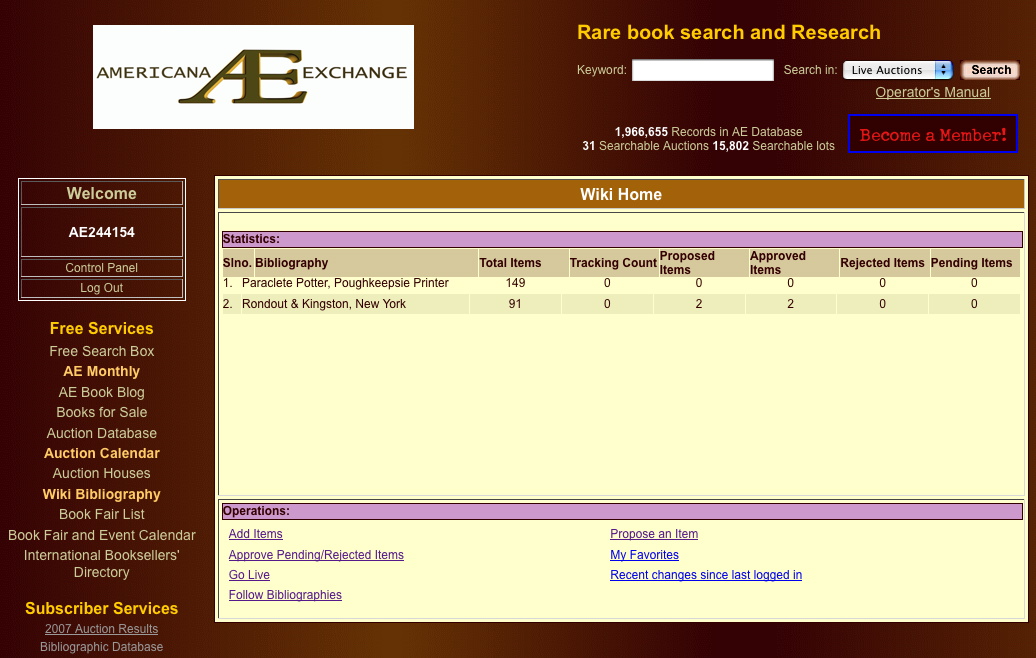The Future of Bookselling
- by Bruce E. McKinney

By Bruce McKinney
Alice Through the Looking Glass
The purchase and sale of rare and collectible books that has been, since the Gutenberg era always improving, now approaches the moment when printed material in all its forms assumes an entirely new structure for research, listing and purchase online. The changes coming are the product of three forces: [1] vastly increased online inventory, [2] a decline in personal contact between bookseller and book buyer and [3] and the requirement that collectors be able to follow, without penalty, their fields as they evolve from day to day. The world of books on line has been structured for the convenience of sellers. In this new world it will be structured for the convenience of buyers.
Personal contact, if not personal relationships, have been at the heart of book collecting, for great collections are often the combination of a dealer's knowledge and a collector's ambition. The dealer's knowledge of what to buy and how to value it and the collector's ambition and financial capability, when working together in an atmosphere of trust are the ingredients usually present in the building of great collections.
Today, throughout the world of books, the great lament is that the next generation of great collectors has yet to appear. They are out there.
Over the past twenty years the speed at which we live has increased and we are all drawn into a faster paced life. We read less, command broader perspectives, manage businesses with fewer people and more automation, vacation further from home, select restaurants in distant cites, read their reviews, make reservations and send confirmations quickly and very matter of factly. These are all aspects of busier, more complex lives. Elements of daily life that have adjusted as we have changed have remained as part of who we are and what we do. Functions that have been slow to change have simply seen their place in the pecking order decline. The book business has been both very fast and very slow to adjust and as a consequence has lost some standing.
The book business has gone online and now suffers from an overwhelming inventory that continues to increase at the rate of 10,000 items every day. For booksellers to post inventory online is an easy decision. It is both simple and relatively cheap. It's also increasingly ineffective because online listing sites assume that collectors know what they are looking for. They do but often only in a general way. In the past collectors' general interests were converted by skilled dealers into specific selections. Today collectors more and more look online themselves. They do it but it is time consuming, often raising thorny questions and too often diminishing enthusiasm. The collector wants to collect but it surprisingly difficult to do so in a time efficient, pleasing way.
The way to overcome the inherent inefficiency of huge searches and large undifferentiated search results is, rather than to send collectors out to search, its to bring all appropriate material within a collection or collector focus onto a single screen and to organize it in a way consistent with how collectors live their busy lives: compartmentalized.
To do this a collecting bibliography is created and material that matches the bibliographic listings brought onto it. A way to structure this is the wiki bibliography which is simply a living [that is, ever-changing] bibliography that encompasses all know material within a field. The bibliography exists as a vertical plane numbering two, perhaps even three thousand items within a collecting focus. Each item has a horizontal plane on which ephemeral listings on eBay and at traditional auctions create short-lived matches that create live links while the material is up for bid. Further along the plane are examples in AE's Books for Sale and other sites that link their listings to these Wiki Bibliographies. As well, for AE research and premium members bibliographic, auction and historic dealer catalogs are linked for price and rarity reference. It's an going cooperative that is everyday updated.